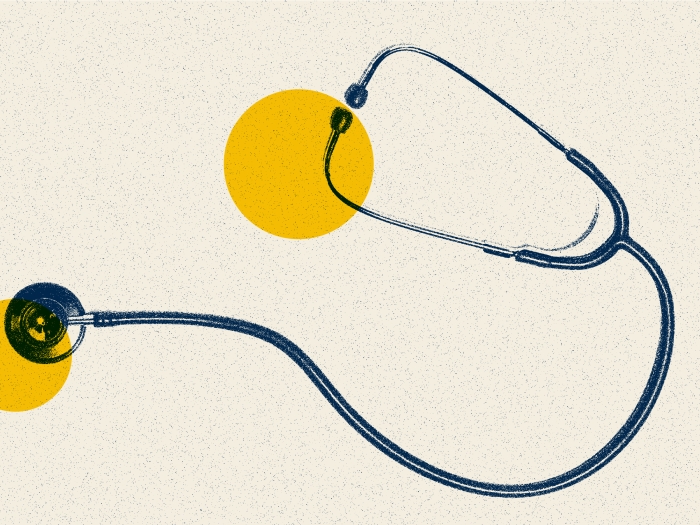Innovative nutrition plan helps toddler with chronic kidney disease avoid dialysis and be eligible for a transplant
1:30 PM
Author |

From the day he was born, Dinero Motton relied on a precise balance of minerals, vitamins and fluids.
The top goal for his family and doctors: to optimize his nutrition while minimizing burden on his kidneys because the organs couldn’t filter out waste properly.
Born with chronic kidney disease, Dinero was frequently hospitalized for lab monitoring and medication adjustments by the pediatric nephrology team at University of Michigan Health C.S. Mott Children’s Hospital.
His providers developed a tailored formula to address mineral deficiencies, maintain nutritional health and avoid dialysis carried out by his mother, Francine Motton.
“Francine basically became a chemist at home, mixing formula, measuring electrolyte doses and monitoring his intake down to the milliliter,” said Michele Mills, C.P.N.P., a pediatric nurse practitioner at Mott who has cared for Dinero since birth.
“She did whatever was necessary to avoid a hospitalization.”
Motton was four months pregnant when she learned her unborn son had a lower urinary tract obstruction and enlarged bladder. As the issue progressed, she was told he’d have a high risk of kidney failure after birth, leading to a referral to University of Michigan Health in 2021.
“It’s an unspeakable feeling to receive that news,” Motton said. “You can’t help but think ‘why my kid?’”
Complex nutritional needs before a kidney transplant
Dinero endured numerous complications associated with his chronic kidney disease, including a bone disorder, excessive urine production and unstable levels of iron, potassium, sodium and magnesium.
As a result of these imbalances, he requires a high intake of fluids that has interfered with the typical development for starting solid foods.
“It’s important to stay on top of feeding and understand that certain things will just come later,” Motton said. “Having a child with chronic illness impacts every area of your life, even the way you have to think.”
Dinero’s formula prescription transformed several times to address his unique dietary needs. Specific changes enabled him to begin gaining weight, something he had struggled with since infancy.
He finally met the body mass index requirement to be considered for transplant eligibility. In October of 2023, he was officially placed on the waitlist.
But in November, routine labs revealed worsening kidney function. Dinero's kidneys were on the brink of failure, placing him in stage five. He was sent to the emergency department to prepare for initiation of hemodialysis therapy, a demanding blood purifying treatment.
“Now that he was on the transplant list, we knew we had to do everything in our power to prevent an invasive procedure,” said Katie Byrne, R.D., a pediatric nephrology dietician at Mott. “If he acquired an infection, he would have to wait even longer for a transplant.”
A recommendation was made to adjust Dinero’s formula recipe – a final attempt to delay dialysis.
“The slightest adjustment to his protein intake allowed him to remain off dialysis and return home to his family,” Byrne said.
“With the trust we had built with Francine, we were confident that she could follow through on this new feeding plan.”
A life-changing procedure
Shortly after this formula change, Dinero was selected to receive a donor kidney. The transplant took place in December 2023 shortly before his second birthday, and was a success.
He now has a teenage-sized kidney inside of him, along with his remaining original kidney. Since receiving the transplant, Dinero continues to come in for weekly appointments, but has been responding positively to the new organ.
“You would never guess he has been through so much when you look at his amazing smile, or get the pleasure of one of his bear hugs,” Mills said.
“His success story is truly a testament to his mother’s strength. She always advocated for Dinero and did so with grace and courage.”
While the team continues to monitor for signs of organ rejection, the goal is that the kidney will last at least 15 years before another transplant is needed. Until then, Dinero is enjoying a happy childhood filled with Cocomelon, toy cars and eating lots of applesauce.
“Watching my son fight this disease has taught me so much as a parent and caregiver,” Motton said.
“I’m so grateful for all of the selfless people at Mott who are making sure he can be a regular kid and have a healthy childhood.”
Sign up for Health Lab newsletters today. Get medical tips from top experts and learn about new scientific discoveries every week by subscribing to Health Lab’s two newsletters, Health & Wellness and Research & Innovation.
Sign up for the Health Lab Podcast: Add us on Spotify, Apple Podcasts or wherever you get you listen to your favorite shows.

Explore a variety of healthcare news & stories by visiting the Health Lab home page for more articles.
Want top health & research news weekly? Sign up for Health Lab’s newsletters today!





